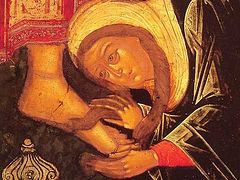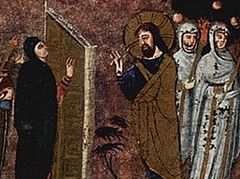Now when Jesus was in Bethany, in the house of Simon the leper, there came unto Him a woman having an alabaster box of very precious ointment, and poured it on His head, as He sat at meat. But when His disciples saw it, they had indignation, saying, To what purpose is this waste? For this ointment might have been sold for much, and given to the poor. When Jesus understood it, He said unto them, Why trouble ye the woman? for she hath wrought a good work upon Me. For ye have the poor always with you; but Me ye have not always. For in that she hath poured this ointment on My body, she did it for My burial. Verily I say unto you, Wheresoever this Gospel shall be preached in the whole world, there shall also this, that this woman hath done, be told for a memorial of her. Then one of the twelve, called Judas Iscariot, went unto the chief priests, And said unto them, What will ye give me, and I will deliver Him unto you? And they covenanted with him for thirty pieces of silver. And from that time he sought opportunity to betray Him (Mt. 26:6-16).
Today the holy Church remembers the exceptional gift of the sinful woman to the Lord on the eve of his suffering on the Cross. It was in Bethany, in a village not far from Jerusalem, in the house of a man whom the Gospel calls Simon the leper. Perhaps he was one of those who were miraculously cleansed of leprosy by the Lord and wanted to express his gratitude to the Lord, and invited Him for dinner. And Christ, who came into the world to heal mankind from the leprosy of sin, not abhorring even the greatest of sinners, went to visit him.
This woman had a vessel of precious myrrh, which she, driven by grace, poured out upon the head of Christ when He was reclining at the table. It was at that time even outwardly perceived in Israel as the highest sign of reverence and piety; but here it was a true confession of her faith in the Lord, in Christ, in the anointed of God. God’s anointed should be anointed, and here, on Earth, He must be our anointed one.
We see how this woman who loved much washes the feet of the Savior, pouring out myrrh upon Him, mixed with her tears. No one should be surprised at what happens where there is genuine love for Christ, because no gift can be too generous where there is genuine love. It’s impossible to say that the offering we bring is enough. Some ask how often we have to go to church, how much to give to the Church, how much we have to pray. The holy Church tells us today that we have not even begun to be Christians if we think about how much we have to bring to Christ and His Church.
However, it turns out that it’s not so simple to learn to live as a Christian. It wasn’t just anybody who asked, “Why this waste?” but the disciples of Christ. That which we sometimes take for a lack of prudence, God takes as overabundant love. This lack of generosity of love—such prudence—can be very dangerous. The disciples of Christ talk about a futile waste at the same time that Christ Himself testifies about it as about genuine love. We must beware of thinking that any labor or work done by us or others for Christ’s sake is unnecessary.
And look at how Christ’s disciples justify themselves in this. This myrrh could have been sold for a great price, and the money distributed to the poor. The Lord rebuked His disciples for the offense they caused the crying woman with these words: Why trouble ye the woman? It means a great sorrow can be brought to genuinely pious people, that is, to those who love the Lord, by those who would like to bring everything into the scope of their soulless reasoning. Or does it mean nothing to us that Christ is so saddened by this on the eve of His suffering on the Cross? Christ comes out against all of His disciples and stands on the side of the woman who brought Him myrrh with weeping. Suddenly we can see the words He spoke previously in a new light: Take heed that ye despise not one of these little ones (Mt. 18:10), because truly these little ones, those who are last, become the first before the Lord.
The one who more than all did not like what this woman had done was, as says the Gospel of John, Judas, one of Christ’s disciples. Judas was an apostle, a preacher of the Gospel, and it was he who condemned this woman for the bounty of her love. It’s sad to see someone in the Church when his life in the Church is limited only to external service, but such was he who would betray Christ.
Today, together with this great woman, we remember on Holy Wednesday the betrayal of Judas. Together with the greatest that was brought by man on the eve of His death on the Cross, there also appears the lowest and vilest that man can commit. We must preserve the memory of this day throughout our entire lives, by prayer and fasting. The Church spreads this Holy Wednesday to every Wednesday of the year, taking care that we might eventually come to understand, finally, what is disloyalty and what is fidelity, and that these are the qualities that define a man.
Look at what a pious pretext Judas finds to hide his discontent. “Why not sell this myrrh and not give the money to the poor?”—it was he who first said these words. The wisdom of this world has penetrated the Church right in front of us. It is ready to call all true zeal for God zeal not according to knowledge. Those who are proud of their external activities and look down upon others for their great piety, say the holy fathers, have more Judas-godlessness within themselves than they think. We see love of the poor and care for works of mercy, which are a cover for avarice. The root of all evil is the love of money, but the door opening the path to every sin is betrayal. Judas said this not that he cared for the poor; but because he was a thief (Jn. 12:6). What were the poor to him, what did he need them for, if not that they served for his base interests?
The holy Church turns our attention today, on the eve of the greatest events of our lives, to the fact that hypocrisy is the most odious sin, and that it is a sin that is very common both in the world and in the Church. Others can fervently defend the interests of their country and even the interests of the Church, being completely indifferent to what will be with the Church and country, and under this pretext think only about how they will make progress, how things will pan out for them better. Best of all for Judas would have been to receive the price of this fragrant myrrh, in cash, so to speak, as he receives when he goes to the High Priest and says, What will ye give me, and I will deliver him unto you? (Mt. 26:15). The traitor receives the Bread of Life in his hand, and in this same hand will be placed thirty pieces of silver, thereby making a deal with the devil; and there is no longer a way back for him. Surprisingly, the other disciples succumb, without hesitation, to this alien voice. Here is a situation much like when Christ said to Peter, Get thee behind me, Satan: thou art an offence unto me: for thou savourest not the things that be of God, but those that be of men (Mt. 16:23).
Let us all be attentive to what we hear, not arrogantly thinking that what the Lord says: One of you shall betray Me, is in no way related to us. Having heard this, the apostles began to ask, Lord, is it I? None of them suspected Judas. Judas was a thief, but none of them even looked at him; no one said, “Lord, is it Judas?” A hypocrite can go through life not only undetected, but even unsuspected, just as money acquired illegally looks like normal money, so no one asks where it’s from. The apostles were ready to sooner suspect themselves than someone else. Lord, is it I? They feared the worst and inquired of Him Who knows us better than we know ourselves.
Lord, is it I? We know how strong a temptation we can be subjected to, but we don’t know the depths of the temptation that the Lord can allow. We don’t know to what extent we can be forsaken by God. Therefore, we have a reason to pray today and always, as the holy Church says today in the stichera, not to highly philosophize about ourselves, but to be filled with fear.
We see how what happened in the house of Simon the Pharisee is connected with the betrayal of our Lord to death. Christ tells His apostles, Ye have the poor always with you; but Me ye have not always (Mt. 26:9). Truly, we always have the opportunity to do good. God’s Providence takes great care about it. It doesn’t happen, and it never will happen that we will be deprived of this opportunity, and we must try to take it all the time. None of those whose hearts strive for good can ever complain that they lack the opportunity. The further the story of mankind moves along, the more evil and lawlessness and bitterness in the world, the more misfortune people have, the more the Lord gives them opportunities to do good.
But there is such a special good, which we can’t do too often, but which we should always prefer to all the rest. But Me ye have not always, says Christ. God must always be in the first place. However, there is a special time when everything, even our good works, should as if disappear, fade into the background, because the Lord Himself has drawn near to us, and He Himself wants to enter into communication with us. Our entire earthly and eternal life depends on how we receive Him. It is happening now, in these Passion days. Our life will depend on how we receive the Lord, on how we participate in what is happening to Him. In Holy Week, neither molebens nor panikhidas are served, and what will happen with us and with our loved ones depends on how we partake in the sufferings of Christ. But if we don’t participate in them, if we do not see that the hour has come when everything is decided, then, of course, we will lose all—every good thing and our entire lives. That is why the Lord renders great praise to the good deed of this sinful woman.
The meaning of her good deed is deeply mysterious. She did it for my burial, says the Lord. She was given better than the apostles to hear Christ’s repeated prophecies of His suffering and death. Christ Himself speaks about it. Amongst the darkness of hatred, cowardice, and betrayal gathering around Him, this act shines like a light. The day of the Lord’s burial is at hand, and she anoints His body, as if He had already been taken from the Cross.
The Church calls upon us this day to pour out upon Him the myrrh of our love. The house was filled with the odour of the ointment (Jn. 12:3) was said about the House of God—about our Church. Throughout all the centuries, the saints, those who have Christ in their hearts, spread this sweet fragrance around themselves, such that, by the gift of Christ, Whom the Church today names the incorruptible Myrrh of life, this fragrant myrrh even sometimes comes from their icons.
What this woman did is so significant that as long as the preaching of the crucified and risen Christ rings out in this world, it will be remembered. All honor and glory belongs to the Lord, however, those holy people who love the Lord are never forgotten by the Church. The most important thing in Christianity is giving yourself in love completely. Everything lies in the mystery of the union of God and man, in our ability to receive from Christ the gift of His sacrifice on the Cross.





